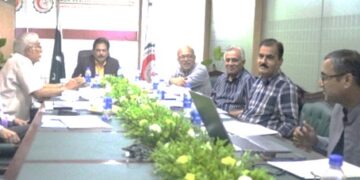The Securities and Exchange Commission of Pakistan (SECP), in collaboration with United Nations Office on Drugs and Crime (UNODC), conducted series of workshops for SECP regulated financial institutions to enhance understanding of the risk-based approach to prevent money laundering and terror financing.
See Also https://theazb-com.stackstaging.com/secp-engages-industry-on-its-digital-transformation-journey/
This initiative was part of the overall SECP AML/CFT capacity building program to enhance the understanding of ML/TF threat and vulnerabilities as identified in the National Risk Assessment 2019 and elevate the level of AML/CFT compliance. The program is supported by UNODC as part of its technical assistance to facilitate enhanced capacity and coordination in combating money-laundering and countering the financing of terrorism based on international good practice and transfer of knowledge on operational expertise. Over 500 professionals from Securities and Commodities markets, Insurance/Takaful companies, Non-Banking Finance Companies and Modaraba sector participated in 15 full day workshops held in Karachi, Islamabad and Lahore in November 2019.
Through these highly productive workshops, Compliance Officers were trained on the application of Risk-Based Approach in light of the National Risk Assessment 2019, particularly focusing on the transnational TF risks. The concept of the Risk-Based Approach under the SECP AML/CFT Regulations, 2018 was explained. The training aimed to enhance understanding of the participants on how to be more vigilant against the latest ML/TF risks faced by their respective organizations and know their role in mitigating those risks. The session also emphasized on the requirement of updating internal policies, procedures and controls, customer due diligence measures, record keeping and UNSCR compliance procedures under the AML/CFT Compliance Framework. This will encourage self-regulation amongst the financial institutions to ensure that they are carrying out the legitimate and essential work.
The participants were also sensitized on money laundering and terrorist financing risks that require submission of the suspicious financial activity so that appropriate information can be filed with the competent authorities. The sessions primarily focused on red flag indicators and unusual transactions relevant to each sector along with subsequent reporting on goAML system of the FMU. The FMU speakers participated in these sessions and shared feedback on STR reporting and improving report quality so that the country has an effective system of generating financial intelligence.
SECP has intensified efforts to develop and maintain an AML/CFT regime that is robust and can effectively respond to the constantly evolving threats and vulnerabilities. These efforts are aimed at protecting the integrity of the financial system and preventing the abuse for criminal and terrorism purposes to advance Pakistan’s efforts in the overall implementation of effective national AML/CFT regimes.
Discussion in the workshops showed that participants had a solid grounding in the AML/CFT framework pertaining to their sector, underscoring the effectiveness and the finely-honed impact of prior measures by SECP. This capacity-building measure provided the support to build on this foundation to rapidly apply the specific AML/CFT measures best suited to the risks faced by the regulated entities.
















